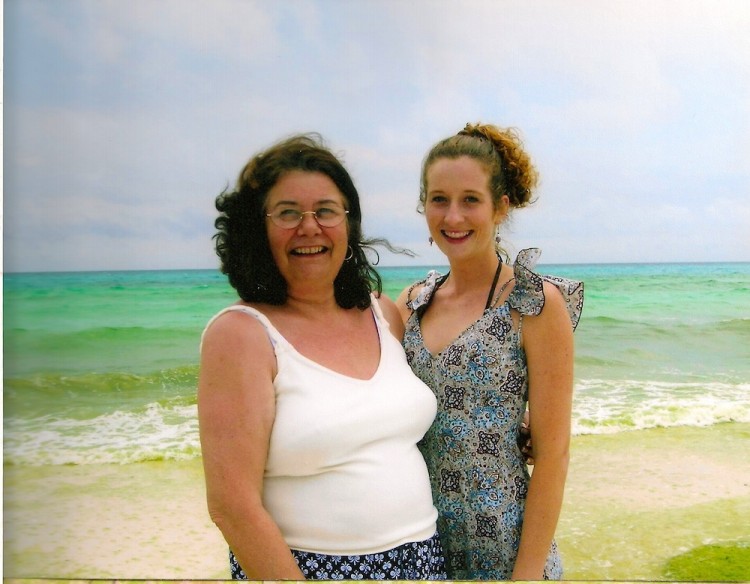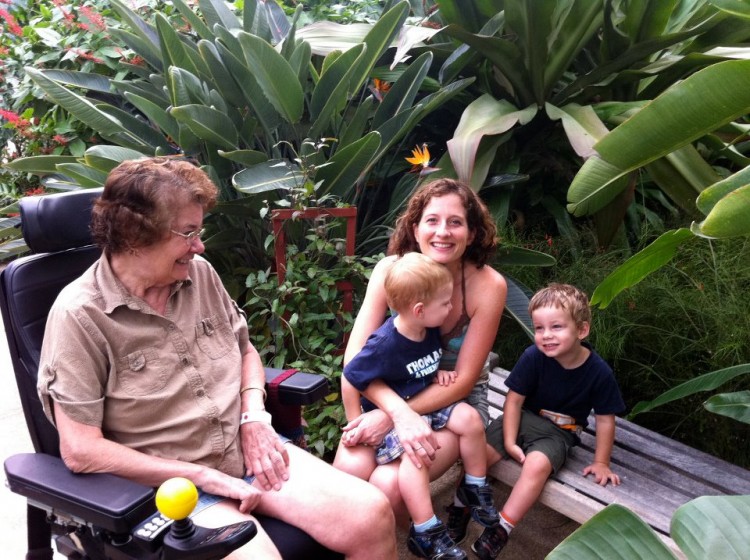I love to celebrate motherhood. Every single day. Isn’t it amazing? Aren’t our mothers just so strong and resilient and beautiful?
I’m never quite sure how to feel about the official Mother’s Day. You know, because some of us aren’t mothers. Or maybe we’re mothers who lost a child. Or children who lost our mothers. But we all have mothers or did at some point. There’s always that.
This story is about my mother.
She’s gone now. But she lived once. She was a beautiful Italian woman with long dark hair and brown eyes. She had strong tan arms and painted scenes of barns and cemeteries and cornfields. Before dying, she held me in those arms and told me I was the wonderful, beautiful girl she always dreamed I would be.
That wasn’t so long ago. I miss her so much.
In life, my mother was a nurse to the dying. She often worked the night shift and would bring me a toasted blueberry bagel with cream cheese on Saturday mornings as I sat watching cartoons. She always told interesting stories about her work. So-and-so had died that night, she’d say, and what a beautiful thing it was.
The deaths she witnessed were spiritual, tragic, often joyful, sometimes angry. Her stories would make you a believer. She wanted to believe.
My mother taught me many things in life – she taught me not to pick my nose or cheat at board games. She taught me to cook and sew and give handmade greeting cards. She taught me the meaning of unconditional love.
But she taught me the most valuable lesson after her death.
She passed away on a Friday morning in October four years ago. Outside, piles of gold and red leaves covered the sidewalks. The sky was blue; the air was crisp and cold. Inside, she lay drowning in fear and discomfort. Her lungs paralyzed, her faith wavering. A woman sat at the foot of her bed, reading aloud from the Holy Bible. I held my mother’s hand. “What if this is all there is?” she’d said a few weeks ago, her voice weak and horse. Each word was a struggle. She’d spent too many painstaking words that day telling me she’d realized it was easier to live when she was sleeping. Life was only hard when she was awake.
As she lay dying, her eyes connected with mine. I kissed her forehead.
“This isn’t all there is,” I whispered. “I promise there’s more. Right now you have one foot in this world and one foot in the next. All you have to do is lift that foot and step over. I promise it will be there. Just let go…”
When the dying take their final breaths, shallow gasps punctuate long periods of silence. The living hold their breath for a moment, too, wondering if that gasp will be the last. And then a sigh of relief as the wait begins again. As I listened and waited, my inner eye perceived a vivid ball of light over my mother’s right shoulder. It radiated joy and peace, confirmation that the next world had been there for her. She was gone. It was done.
Minutes later, a nurse quietly jotted down the time.
I didn’t cry. I felt like I should, but the tears wouldn’t come. Everyone grieves differently, I suppose. I grieved while listening to Duane Allman’s “Goin’ Down Slow” on repeat, staring at our bedroom wall. I didn’t like to come home so I shopped for new clothes and wooden train track sets for the boys and other things we didn’t really need. I remember one afternoon begging my husband to build train tracks with me on our living room floor. I took great comfort in avoidance, distraction, denial.
The first few years after my mother died, I dreamed almost nightly that we were having lunch or sipping Dunkin Donuts coffee or cooking dinner or making soaps. Every night we melted glycerin and carefully poured it into the molds. We popped in another videotape, a comedy this time. We laughed and talked about things happening in my life. “Have you ever heard of Ghost pepper?” I asked her one night as I dreamed. “Marcus says it’s the hottest pepper in the whole world.” We tried it, and it wasn’t that bad. Can you believe that? Every night she was healthy again, in remission from a disease that in reality always kills. ALS. Every night in my dreams, she beat the odds.
Only last year, in deep meditation at a craniosacral therapy workshop, did it finally dawn on me that my mother is gone. Like gone gone. Why this realization came more than three years after her death, I don’t know. Maybe that’s how denial works. But as I entered the vast spaciousness of meditation that day, the truth came booming out of nowhere. A sudden, awful shock. I think it was meant to come gently, but it felt like a train crash. I grieved hard that day. I cried loudly and messily. I ran out of tissues and started on the toilet paper. It felt out of place and liberating to grieve after that much time. It was a good thing.
Since that day, she’s only visited me a few times in my dreams and never as the woman she once was. One night, I dreamed we were debating what it means when people say that life is a journey, not a destination. “What is that supposed to mean anyway?” I said to her in my dream. “I always took it to mean that you should stop to smell the roses and all that.”
But my mother responded that to journey means to surrender. To surrender the desire to win, to be perfect, to be the fastest or the best. “If we’re all floating in a sea of emotion,” she said, “then to journey through life means to feel all of those emotions without denying yourself the experience that each one brings. To feel pain, regret, doubt, love, joy and remorse all at once and to learn from them. To feel elated about your child’s faltering first steps in the same moment you feel heartbroken about your mother’s faltering final steps. To let yourself bob along in the gentle sea of life with trust instead of fear. To be. Only then can you reach your destination.”
“The journey matters,” I heard her say before I woke up.
Don’t deny yourself the journey.
Happy journeying.
This post originally appeared on Team Bunz.
The Mighty is asking its readers the following: Describe a memory with a loved one that you didn’t realize meant so much to you until they passed away. If you’d like to participate, please send a blog post to community@themighty.com. Please include a photo for the piece, a photo of yourself and 1-2 sentence bio.
Want to celebrate the human spirit? Like us on Facebook.
And sign up for what we hope will be your favorite thing to read at night.


